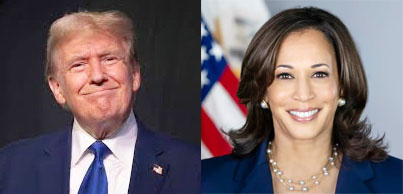“Explosive Debate: How Trump and Harris Are Igniting Political Violence—What You Need to Know!”
The Debate Between Trump, Harris, and the Escalation of Political Violence: Key Issues and Implications In recent years, political discourse in the United States has taken a notably confrontational tone, with figures like former President Donald Trump and Vice President Kamala Harris often at the center of national debates. One of the most contentious issues…
The Debate Between Trump, Harris, and the Escalation of Political Violence: Key Issues and Implications
In recent years, political discourse in the United States has taken a notably confrontational tone, with figures like former President Donald Trump and Vice President Kamala Harris often at the center of national debates. One of the most contentious issues concerns political violence and its underlying causes, including the rhetoric used by political leaders and the polarized nature of American politics. The dynamics between Trump, Harris, and the broader issue of political violence highlight some of the most pressing challenges facing the country.
Trump’s Rhetoric and Its Consequences
Donald Trump’s political career has been marked by a style of rhetoric that many critics argue has contributed to a rise in political extremism and violence. From his controversial comments during his presidential campaigns to his actions surrounding the January 6, 2021, Capitol insurrection, Trump has faced accusations of fueling division and inciting violent behavior. His “America First” agenda, while resonating with a large portion of the American electorate, has been criticized for stoking nationalist sentiments and emboldening far-right groups.
The January 6 insurrection serves as a stark example of how rhetoric can translate into action. Following months of claims that the 2020 presidential election was “stolen,” Trump’s supporters stormed the Capitol, disrupting the certification of the Electoral College vote. The event has since sparked an ongoing national conversation about the role of political leaders in inciting violence and the responsibility they bear in ensuring a peaceful democratic process.
Kamala Harris: A Different Approach to Leadership
Vice President Kamala Harris, on the other hand, represents a more traditional, measured approach to political discourse. As a former senator and state attorney general, Harris has consistently emphasized the importance of dialogue, inclusivity, and justice in addressing the nation’s issues. Her stance on political violence has been one of condemnation, calling for accountability and unity in the face of divisive rhetoric.
However, Harris has not been immune to criticism. Some on the right have accused her of supporting violence during the Black Lives Matter protests in 2020. Harris’s support for bail funds for protesters led to accusations that she was encouraging civil unrest, although her intentions were largely focused on ensuring justice for peaceful demonstrators who were unfairly detained. This highlights the difficulty politicians face in navigating issues related to protests, violence, and public discourse.
The Broader Context of Political Violence
Political violence in the United States is not a new phenomenon, but its recent rise is alarming. The sharp polarization of the political landscape, combined with social media’s ability to spread inflammatory content, has created an environment where violent rhetoric can quickly translate into real-world violence. The FBI and Department of Homeland Security have identified domestic terrorism, often tied to political extremism, as a growing threat.
At the heart of the debate is the question of responsibility. Political leaders have a significant role in shaping public attitudes and behaviors, and their words can either de-escalate or exacerbate tensions. Trump’s critics argue that his refusal to unequivocally condemn white nationalist groups and his rhetoric about election fraud have contributed to an atmosphere of distrust and anger. Conversely, those who defend Trump claim that the mainstream media and political establishment have unfairly painted him as a villain, exacerbating divisions.
Harris and other Democratic leaders, meanwhile, are tasked with addressing these tensions without further alienating large segments of the population. Their approach has often centered on calling for unity, but the challenge remains in finding common ground in such a deeply fractured nation.
Moving Forward: Bridging the Divide
As the 2024 election cycle looms, the debate over political violence and the role of leaders like Trump and Harris will undoubtedly intensify. Finding a path forward requires more than just condemning violence—it involves addressing the underlying causes of division and building a political culture that prioritizes dialogue over confrontation.
One potential solution lies in bipartisan efforts to establish norms of civility and accountability. Both parties must work to ensure that political rhetoric does not escalate into violence, while addressing the concerns of their respective constituencies. This includes holding accountable those who incite violence, whether through inflammatory speech or encouragement of unlawful behavior.
Ultimately, the debate between Trump, Harris, and the broader issue of political violence reflects the state of American democracy. It highlights the importance of responsible leadership, the need for dialogue, and the urgent task of healing a nation that remains deeply divided. Only through addressing these core issues can the U.S. begin to curb the rise of political violence and foster a more united and peaceful society.






